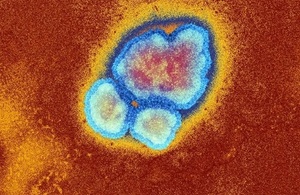MMR vaccination call following recent measles cases
Increase in measles cases since February prompts measles mumps and rubella (MMR) vaccination call.

Increase in measles cases since February prompts call. [Credit: EDAM photo library]
Public Health England (PHE) is asking people to check that they have received two doses of Measles Mumps and Rubella (MMR) vaccine and to be aware of the signs and symptoms of measles following an increase in confirmed cases over the past few weeks.
Since the beginning of February 2016, 20 cases of measles have been confirmed across London (12 cases) and the East of England (Cambridge – 3 cases; Essex – 2 cases; Hertfordshire – 3 cases), predominantly in unimmunised adolescents and young adults (aged 14 to 40 years). Many of these cases have been admitted to hospital.
Measles is a highly infectious viral illness that can be very unpleasant and sometimes lead to serious complications. It’s now uncommon in the UK because of the effective MMR vaccination programme. Although usually a mild illness in children, measles can be more severe in adults.
Dr Kevin Brown, Deputy Director of the Virus Reference Department at Public Health England, said:
While measles is now relatively uncommon in England thanks to the MMR vaccine, those who are unvaccinated, or not fully vaccinated, remain susceptible to the disease.
The cases we have seen recently have been confirmed mainly in adolescents and young adults. It’s important to be aware that it’s never too late to have the vaccine, so if you’ve not received two doses of the vaccine in the past – or you’re unsure – speak to your GP. There’s no harm in receiving an additional dose where there is any uncertainty.
Also remain alert to measles, which can include cold-like symptoms, sore red eyes, a high temperature or a red-brown blotchy rash. If you experience these symptoms seek medical attention, but be sure to phone ahead before you visit your GP surgery so arrangements can be made to prevent others from being infected.
You should also see your GP if you’ve been in close contact with someone who has measles and you’ve not been fully vaccinated (had two doses of the MMR vaccine) or haven’t had the infection before – particularly those who are immunosuppressed, pregnant or infants.
Measles activity in England has been at historically low levels since the successful MMR catch-up immunisation campaign in 2013, which targeted unimmunised and partially immunised adolescents aged 10 to 16 years. 103 and 91 cases of measles were confirmed in England during 2014 and 2015 respectively.
The MMR vaccination is routinely provided as part of the NHS Childhood Immunisation Programme in England. Uptake is high with more than 90% of children receiving 1 dose of the vaccine by 2 years of age since 2011 and 2012.
Measles signs and symptoms
The initial symptoms of measles develop around 10 days after a person is infected. These can include:
- cold-like symptoms, such as a runny nose, sneezing, and a cough
- sore, red eyes that may be sensitive to light
- a high temperature (fever), which may reach around 40C (104F)
A few days later, a red-brown blotchy rash will appear. This usually starts on the head or upper neck, before spreading outwards to the rest of the body.
Symptoms usually resolve in about 7 to 10 days.